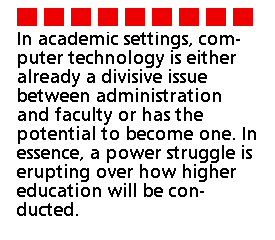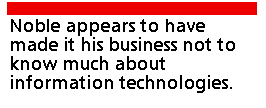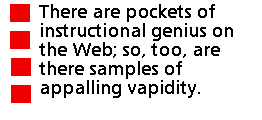Professor David Noble's series of three papers, which appeared in 1997-98 under the uniform title, Digital Diploma Mills, has provoked widespread debate and controversy. Noble contends that technology in general, and Internet/Web-based technologies in particular, are instruments of social control that neither faculty nor students want. Noble is leading the battle to wrestle technology from the grips of conniving university administrators and greedy corporate CEOs. Is Dr. Noble right? Partly. While I support his defense of faculty rights, I challenge his biased and ill-informed opinions about distributed learning technologies and I worry that he may be alienating potential faculty and student allies. Professor Noble seems convinced the battle is won. In my view, the victory parade is premature.
Contents
Introduction
Noble's thesis
Where we agree
Where we disagree
Acknowledging biases
On the question of pedagogical effectiveness
The Question Noble should have asked
It takes time to discover the advantages of a new technology
On the Quality of Internet/Web-based instruction
Wrapping up loose ends
Has the juggernaut of online education really stalled?
Conclusion
Introduction
In October 1997, Professor David Noble, Historian of Technology at York University in Toronto and Hixon/Riggs Visiting Professor of Science, Technology, and Society at Harvey Mudd College in Claremont, California released a modest little paper titled Digital Diploma Mills: The Automation of Higher Education (Noble, 1997). Things haven't been the same since. The paper has sparked widespread controversy and generated "the first major North American conference devoted exclusively to a critical assessment of the use of computer-based instructional technologies in higher education" ("Digital diploma mills?" n.d.). Perhaps it was the groundswell of discussion and debate that inspired Noble to issue two subsequent papers on the same theme (Noble, 1998a, 1998b).
Noble's thesis
What did Noble say that has so shaken the hallowed halls of academe? In his initial paper, Noble (1997) contends that university administrators, in collusion with high-tech corporations and emerging educational industries, are plotting the top-down, profit-driven commercialization of higher education as "courseware." In the ensuing power struggle, pitting classroom against the board room, the stakes are no less than control over higher education. If the board room wins, warns Noble, "we will look upon the wired remains of our once great democratic higher education system and wonder how we let it happen" (last paragraph). He sees early signs of the damaging effects of the automation of education: escalating technology-driven costs, deterioration of educational quality, erosion of faculty and student input in the academic decision making process, undermining of the autonomy and independence of faculty, loss of faculty control and ownership over their intellectual property, increasing automation and/or outsourcing of the teaching role, contracting out of online course design to instructional designers, loss of face-to-face interaction with students, administration portraying faculty who resist automation as "obstructionist," and loss of student privacy through the monitoring and archiving of distance learning courses. In Part II, Noble lays out the evidence to support the case that confidential agreements between universities and private companies pose a serious threat to faculty intellectual property rights (Noble, 1998a). And then, in Part III, Noble assesses the fallout from a campaign he helped to instigate and proudly proclaims victory; "the bloom is off the rose¡ the juggernaut of online education appears to have stalled" (Noble, 1998b).
Where we agree
I concur with much of Noble's stinging indictment. Technology is often used as an instrument of social control (Agre, n.d.). In academic settings, computer technology is either already a divisive issue between administration and faculty or has the potential to become one. In essence, a power struggle is erupting over how higher education will be conducted. Battles for power are hardly ever amicable affairs, and I can understand why faculty may be tempted to portray administrators as evil conspirators. I have a more benign view; I see administrators as simply having a different set of concerns and interests that sometimes puts them at odds with faculty. This does not make them inherently evil. In any case, power disparities can give one interest group strategic leverage over another, so I support faculty efforts to maintain a level playing field by protecting their pedagogical rights and interests. Conflict is an inevitable and unavoidable part of organizational life. The resolution process is critical; if both parties are wise, they will negotiate win-win outcomes. Unfortunately, wisdom is often the first casualty of confrontation, especially when the stakes are high.

Where we disagree
Although I share and support many of Noble's social concerns and causes, when it comes to the value of the technology as a tool for distributed learning and instruction, we part company. I disagree, for instance, that there is no real evidence of pedagogical usefulness of online instruction, that computer-based instruction reduces performance, that cybereducation is inferior, that students neither demand nor support online initiatives, that instructors will not be able to cope with increasing demands on their time, and that the relationship between teacher and student can never be replaced electronically (Noble, 1997; 1998b). In this paper, I will address and rebut these allegations.
Acknowledging biases
According to Philip Agre, Noble is "flat out opposed" to technology (n.d., paragraph 2). One critic has even labeled Noble a "Neo-Luddite" (DeLong, 1998). Agre, a computer scientist and co-panelist with Noble at the Digital Diploma Mills conference at Harvey Mudd College in California, has discussed technology with "Dave" and they agree to disagree. To Noble "technology means social control" (paragraph 1). Agre, on the other hand, sees technology as " ... opportunities ... for more fully embodying the values of a democratic society in the institutions of higher education" (paragraph 4). I found this comment by Agre particularly interesting and revealing of the extent of Noble's anti-technology bias:
"He has been unable to publish this article in a magazine, despite having been commissioned to write it, and so he has been circulating it among his professional colleagues, who have already given it something of the status of academic samizdat. I jokingly taunted him, suggesting that now he's starting to get the point of the Internet ... . Although I couldn't quite pin him down, it did sound like he was going to capitulate and start reading his e-mail" (paragraph 5).

Ultimately, Noble's bias makes him less convincing. Speaking for myself, when it comes to information technology, I am an early adopter and advocate. As a self-taught programmer, I have written software applications that have dramatically increased library productivity (White, 1990). I have evaluated the tools used to create instructional content for the Web (White, 1997). I have developed computer-based self-instructional applications for library employees. And this very paper is a product of a distance-education, computer-mediated conferencing course. I have done my homework and am informed by experience, the best teacher. In that sense, I have an advantage over Noble; I know what I am talking about.
As Agre has hinted, Noble appears to have made it his business not to know much about information technologies. For instance, his choice of words betrays a superficial knowledge of the technology that he refuses to use. Noble always refers generally and collectively to "cybereducation," "online instruction," "prepackaged courses," "products," "computer-based courses," "computer-based instruction," "distance learning," "information technology." But Internet/Web-based technologies come in many flavors. Web-based instructional tools and applications include: Virtual Reality Modeling Language; multipoint video conferencing; teleconferencing; digital video and audio broadcasts; interactive multimedia, self-instruction modules; audio-text lectures; audio-slide presentations; plain text applications; and by far the most popular of all higher education tools, computer-mediated conferencing (White, 1999). Speculating in generalities can offer protection from being pinned down by specifics; on the other hand, it can make a thesis less convincing.
On the question of pedagogical effectiveness
A little learning does not dissuade Noble from taking potshots at the pedagogical effectiveness of information technology. In one paper, he equivocally declares: "Study after study seems to confirm that computer-based instruction reduces performance levels ... " (1998c, paragraph 5). What studies? Noble doesn't cite any. In any event, 50 years of research on instructional effectiveness has proven inconclusive (Owston, n.d., paragraph 19). Elsewhere Noble writes: "Recent surveys of the instructional use of information technology in higher education clearly indicate that there have been no significant gains in ... pedagogical enhancement" (1997, final footnote). After piecing together citation clues, I was able to identify Green (1999) as the probable source, and managed to track down a summary of the cited report (Green, 1998). While the executive review failed to affirm Noble's "no pedagogical enhancement" claim, ironically, it countered his contention that students neither demand nor support online initiatives. The survey shows that more courses are using more technology, e-mail use is up significantly, more classes are tapping into Internet resources as part of the syllabus, more instructors are using Web pages for class materials and resources, "large numbers of both students and faculty routinely use the Internet," and "compared to other 'wired workers,' students and faculty appear to make an extra effort to get their 'daily dose' of the Internet and WWW" (paragraphs 4-6).
The Question Noble should have asked
More to the point, had social history professor Noble read papers by Ronald Owston, one of his colleagues at York University, or Stephen Ehrmann (1997), he might have realized that to question pedagogical effectiveness of information technology is to ask the wrong question. As Ehrmann observes:
"The first group of useless questions seek universal answers to questions about the comparative teaching effectiveness and costs of technology ... That question assumes that education operates something like a machine ..." (paragraph, 3).Owston, who is the Director of the Centre for the Study of Computers in Education at York, points out:
"... we cannot simply ask 'Do students learn better with the Web as compared to traditional classroom instruction?' We have to realize that no medium, in and of itself, will likely improve learning in a significant way when it is used to deliver instruction. Nor is it realistic to expect the Web, when used as a tool, to develop in students any unique skills" (Owston, n.d., paragraph 21).The right question to ask, contends Owston, is: What distinct advantages does an instructional technology offer that instructors can exploit to promote improved learning? And for Owston, the Internet/Web offers at least three advantages:
- younger college students find the interactive, graphical interface appealing;
- it provides a self-paced, expert-directed, time/place independent environment for learning; and
- in the hands of an able instructor, the Web fosters the development of critical thinking, problem solving, written communication, and opportunity to work collaboratively.
When Noble strays outside of his field of expertise, he reveals gaps in his knowledge and his arguments are less convincing.
It takes time to discover the advantages of a new technology
It usually takes time to discover and invent the advantages of a new technology. Even though Web technologies have been with us for less than a decade, Noble has already denounced them as useless. Compare Noble's close-minded dismissal of the technology with Feenberg's (1997) open-minded spirit of exploration and experimentation. Feenberg worked on a design team that created the very first online educational program back in 1981. Through a patient process of trial and error, the team discovered the strengths and weaknesses of computer conferencing, leading ultimately to "... a Socratic pedagogy based on virtual classroom discussion that proved quite successful" (paragraph 6). Back then "these experiments were all championed by enthusiastic professors who involved their students in an adventure on the frontiers of technology" (paragraph 9). I suggest that Noble's rush to judgment reflects his preoccupation with protecting faculty interests and preserving the status quo, and not with what is in the best interests of students. Keep in mind what motivates Dr. Noble; fear of technology, fear of loss of control, fear of what he does not know and chooses not to know.
On the Quality of Internet/Web-based instruction
Noble mentions repeatedly that he and like-minded faculty are battling "to preserve quality education" (1997, paragraph 25). How noble! "Quality" is a value term and a matter of subjective, personal opinion. Therefore, it is relative and variable. There is no supreme arbiter of quality, not in this postmodern world. Noble judges that all online education is uniformly bad. I say that it is uneven (White, 1999). Where does that leave us? It is a futile dispute that leads nowhere. There are pockets of instructional genius on the Web; so, too, are there samples of appalling vapidity. Just like the classroom. The classroom does not automatically confer upon the lecturer the gift of pedagogical brilliance. Internet/Web technologies are tools. They can be used skillfully or imperfectly. Whether they have been used well or poorly is a matter for individual students to decide, not Dr. Noble.
Wrapping up loose ends
Turning to Noble's other criticisms of "cybereducation" (his term), and starting with the issue of student demand, Noble declares that at York University "... there has been no such demand on the part of students ... that faculty make fuller use of the Web site technology in their courses" (1997, paragraph 26). Is this really something to boast about? Students in most other places may not be demanding Internet/ Web technologies, but they certainly seem to be using them - in record numbers (Green, 1998).
With the critic's gift for hyperbole, Noble contends that computer-based teaching places "limitless demands upon instructor time" (1997, paragraph 8). While evidence confirms that Web-based instruction can be time-consuming (White, 1999), the sheer number of educational sites on the Web and the growth of distributed learning suggest that many instructors are managing their time very efficiently.

Is it true that "the relationship between teacher and student 'is an experience you can never replace electronically'" (Noble, 1998b, paragraph 27)? Perhaps. Then again, perhaps not. Surely, it's a matter of personal opinion. Others, including Noble's colleague at York, suggest a different experience. Speaking of a Web-based distance-education course offered by Britain's Open University, a "... project evaluator wrote that the level of contact and interaction among students and instructors [was] [sic] very similar to regular summer classes" (Owston, n.d., paragraph 5). Stalemate!
Has the juggernaut of online education really stalled?
Dr. Noble seems positively gleeful when he triumphantly announces, a tad prematurely, I suggest, that "... the juggernaut of online education appears to have stalled" (1998b, paragraph 3). For evidence, he points his finger at countless failed efforts, including: rejection of the California Educational Technology Initiative (CETI); University of Washington's drive to force the governor to back away from a virtual education agenda; disappointing enrollment at Western Governors' Virtual University; and the historic two-month strike at York University, which secured formal contractual protection against administrative online education initiatives (1997, 1998b). The striking thing that all these failures have in common is that they are all top-down initiatives. That juggernaut deserves to fail. I just hope that Noble's campaign does not stall or complicate efforts at the grassroots level, for that is the proven strength of the Internet, and that is where the gains will be made. Sorry, Dr. Noble, the bloom is not yet off the rose.
Conclusion
Dr. Noble is right to oppose university administrators and their profit-motivated corporate partners in their plots to use technology to control higher education. This top-down process to change is deservedly doomed to failure, and I wish Dr. Noble a speedy victory. Unfortunately, rather than focusing his attack on the process, he is unable to control his strong anti-technology bias and risks losing the support of those he needs most - faculty and students - with indefensible attacks on the technologies of distributed learning and instruction. Such a waste!
About the Author
Frank White is Library Director at Marygrove College in Detroit, Michigan.
E-mail: fwhite@marygrove.eduReferences
Phil Agre, n.d. "Preface to David Noble's paper, Digital diploma mills: The automation of higher education."
Brad DeLong, 1998. "Attack of the Neo-Luddites."
Stephen C. Ehrmann, 1997. "Asking the right question: What does research tell us about technology and higher learning?"
Andrew Feenberg, 1999. "Distance learning: Promise or threat?"
Kenneth C. Green, 1998. "The 1998 National survey of information technology in higher education: Colleges struggle with IT planning."
Kenneth C. Green, 1999. Campus computing, 1998: the ninth national survey of desktop computing and information technology in American higher education. Encino, Calif.: Campus Computing.
Harvey Mudd College, Department of Humanities and Social Sciences (Claremont, Calif.) "Digital diploma mills? A second look at information technology and higher education: April 24 - April 25, 1998" [Conference].
David F. Noble, 1997. "Digital diploma mills: The automation of higher education." See also the version published in First Monday.
David F. Noble, 1998a. "Digital diploma mills, Part II: The coming battle over online instruction: Confidential agreements between universities and private companies pose serious challenge to faculty intellectual property rights."
David F. Noble, 1998b. "Digital diploma mills, Part III: The bloom is off the rose."
R.D. Owston, n.d. "The World Wide Web: A technology to enhance teaching and learning?
Frank White, 1990. "The role of the Automation Librarian in the medium-sized library," Canadian Library Journal, volume 47, number 4, pp. 257-262.
Frank White, 1997. "Multimedia authoring tools: ToolBook II Instructor and Click & Create," Library Software Review, volume 16, number 3, pp. 137-151.
Frank White, 1999. "Internet/Web-based distributed learning and instruction: An overview of the technology, instructional delivery tools and applications, and teaching and learning issues," Unpublished manuscript.


Copyright © 1999, First Monday